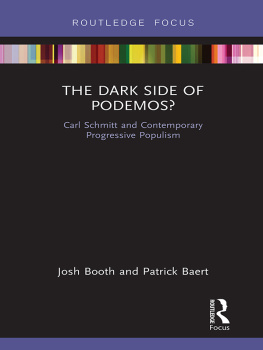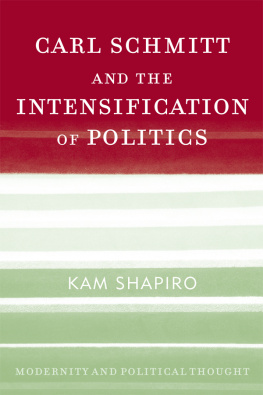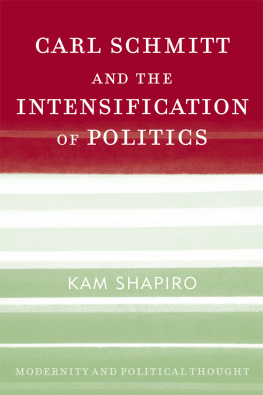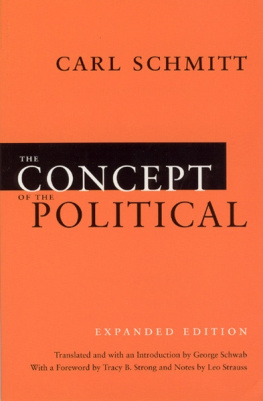In this intriguing narrative in political theory, Booth and Baert trace the multi-layered and often surprising connections between the conservative philosophy of the Nazi jurist Carl Schmitt and the progressive populism of Podemos. In the process they consider the analogies between WeimarGermany and contemporary Spain, General Francos regime and the warm reception for Schmitts views on power, the political, the exception, and decisionism. In tracing the connections between the Podemos leadership and Schmitts critique of liberalism and parliamentary democracy, they also describe the profound crisis within the European Union between Germany and its underdeveloped periphery. A tour de force, the authors develop a compelling historical sociology of ideas and expose the ambiguities of populism as appealing to extreme right and left politics, and simultaneously dissolving this political division.
Bryan S. Turner ACU (Melbourne) and Potsdam University Germany
The Dark Side of Podemos?
In 2014 a new progressive party, Podemos, emerged on the Spanish political scene. Within just over two years it had become the countrys third biggest party, winning a slew of seats in parliament and regularly making headline news. While some saw Podemos as the saviour of Spanish democracy, others accused it of corrosive populism. But what few noticedwas that behind its distinctive rhetoric lay a thinker closely associated with Germanys Third Reich: Carl Schmitt.
Why did an ostensibly progressive and avowedly anti-fascist political party take up Schmitts ideas? The puzzle only deepens when we learn of Schmitts links with Francisco Francos dictatorship. In The Dark Side of Podemos?, Booth and Baert explain why Schmittian theory resonated with Podemos founders. In doing so, the authors position Podemos and the ideas that guide it within the context of recent Spanish history and ongoing politics of memory, revealing a story about how personal and political narratives have combined to produce a formidable political force.
This enlightening monograph will appeal to undergraduates and postgraduates, as well as postdoctoral researchers, interested in fields such as Politics, Political Theory and Sociology. It will also be relevant to those curious about contemporary Spanish politics, the nature of populism, the future of the European left, or Carl Schmitt and his links with Spain.
Josh Booth is a Teaching Associate in the Department of Sociology at the University of Cambridge, UK.
Patrick Baert is Professor of Social Theory at the University of Cambridge, UK.
Routledge Advances in Sociology
For a full list of titles in this series, please visit www.routledge.com/series/SE0511
Social Generativity
A Relational Paradigm for Social Change
Edited by Mauro Magatti
The Live Art of Sociology
Cath Lambert
Video Games as Culture
Considering the Role and Importance of Video Games in Contemporary Society
Daniel Muriel and Garry Crawford
The Sociology of Central Asian Youth
Choice, Constraint, Risk
Mohd. Aslam Bhat
Indigenous Knowledge Production
Navigating Humanity within a Western World
Marcus Woolombi Waters
Time and Temporality in Transitional and Post-Conflict Societies
Edited by Natascha Mueller-Hirth and Sandra Rios Oyola
Practicing Art/Science
Experiments in an Emerging Field
Edited by Philippe Sormani, Guelfo Carbone and Priska Gisler
The Dark Side of Podemos?
Carl Schmitt and Contemporary Progressive Populism
Josh Booth and Patrick Baert
Intergenerational Family Relations
An Evolutionary Social Science Approach
Antti O. Tanskanen and Mirkka Danielsbacka
The Dark Side of Podemos?
Carl Schmitt and Contemporary Progressive Populism
Josh Booth and Patrick Baert

First published 2018
by Routledge
2 Park Square, Milton Park, Abingdon, Oxon OX14 4RN
and by Routledge
711 Third Avenue, New York, NY 10017
Routledge is an imprint of the Taylor & Francis Group, an informa business
2018 Josh Booth and Patrick Baert
The right of Josh Booth and Patrick Baert to be identified as authors of this work has been asserted by them in accordance with sections 77 and 78 of the Copyright, Designs and Patents Act 1988.
All rights reserved. No part of this book may be reprinted or reproduced or utilised in any form or by any electronic, mechanical, or other means, now known or hereafter invented, including photocopying and recording, or in any information storage or retrieval system, without permission in writing from the publishers.
Trademark notice: Product or corporate names may be trademarks or registered trademarks, and are used only for identification and explanation without intent to infringe.
British Library Cataloguing in Publication Data
A catalogue record for this book is available from the British Library
Library of Congress Cataloging in Publication Data
A catalog record for this book has been requested
ISBN: 978-0-8153-8072-6 (hbk)
ISBN: 9781351212557 (ebk)
We would like to thank Emily Briggs and Elena Chiu from Routledge who have provided continuous support for this project. We are immensely grateful to Tiago Carvalho, Duncan Kelly, Jeff Miley and Peter Wagner; each took time to cast an expert eye on this manuscript, providing useful feedback. Vera Chapman Brownes copy-editing was excellent and so was Marina Hambachs additional editorial assistance. The comments by the anonymous readers were extremely valuable. Thanks too to Alex Lau-Zhu, without whose support the book would not have been possible.
The research leading to these results has received funding from the European Union Seventh Framework Programme (FP7/20072013) under Grant Agreement no. 319974 (INTERCO-SSH). Some of our findings were presented at the final conference of the INTERCO-SSH project at the cole des hautes tudes en sciences sociales (EHESS) in Paris (2325 February 2017), and the discussions at the conference were very helpful. In the context of this research project, we benefited from conversations with Christian Fleck, Johan Heilbron, Victor Karady, Marco Santoro, Gisle Sapiro and Gustavo Sor.
In 1977, almost two years after the death of Francisco Franco, the German jurist Carl Schmitt published an article in the Spanish newspaper El Pas calling for an amnesty, a mutual act of forgetting (Schmitt, 1977). An amnesty in the true and authentic sense of the word, Schmitt wrote, signifies nothing less than the end of civil war. By this time almost forty years had passed since the end of the Spanish Civil War (193639), and just over thirty years since the defeat of German National Socialism, the political movement with which Schmitt is most closely associated. Since 1945 Schmitt had been unable to work in German academia because he had refused to accept his own denazification, expecting, perhaps, that he himself would be granted the dignity of amnesty. But in Spain he had found something of a second home. It was through his daughter Animamarried from the 1960s to Alfonso Otero, a Spanish professor of legal history, and living in Spainthat Schmitt authorised publication of the El Pas article, which he had in fact written in 1949. The family had a farm in Santiago de Compostela, where Schmitt would spend his summers with his daughter and grandchildren (Rodrguez Mourullo 2011). On Thursdays, when there was a market in the town, Schmitt could be seen on the corner of the street watching the rustic scene. With time, recalls sociologist Fermn Bouza, who grew up in the city, I guessed the meaning of his gaze, which was directed towards nostalgia for rural and medieval Europe, which was already lost (Bouza 2012).













